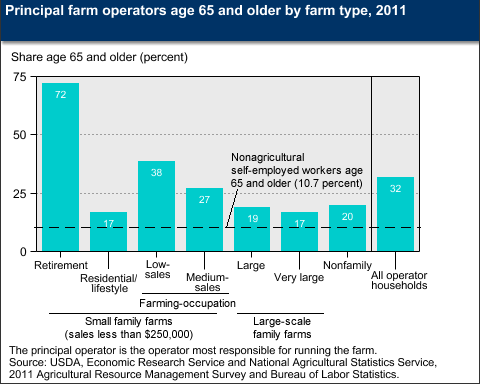Many farm operators are retirement age
- by Robert A. Hoppe and Daniel Milkove
- 1/24/2013

One of the most striking characteristics of U.S. principal farm operators—the operator most responsible for running the farm—is their advanced age. In 2011, about 32 percent of principal farm operators were at least 65 years old, compared with less than 11 percent of nonagricultural self-employed U.S. workers. Not surprisingly, retirement farms--those operated by farmers who consider themselves retired--had the highest percentage of older operators (72 percent). Among the principal operators of larger family farms (those with annual sales of at least $250,000) and operators of smaller farms that consider farming their primary occupation, the share of older operators declines as farm size increases. Thirty-eight percent of low-sales farm (under $100,000 in sales per year) operators are at least 65 years old, while 17 percent of operators running very large farms (with annual sales of $500,000 or more) are that old. The advanced age of so many farm operators is understandable given that the farm is the home for most farmers and they can phase out of farming gradually. This chart updates one found in the ERS report, America’s Diverse Family Farms, 2010 Edition, with data from the 2011 Agricultural Resource Management Survey, added to the ERS Web tool in November 2012.


